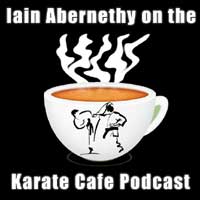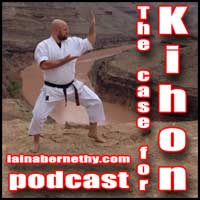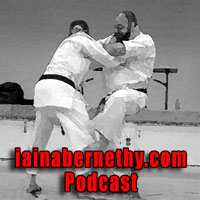 This isn’t an Iain Abernethy podcast … but it is a podcast featuring yours truly! Just before Christmas I was on the Karate Café Podcast (check it out!) and we had an enjoyable and wide ranging discussion! The folks at Karate Café have kindly let me share it here too and I hope you enjoy it!
This isn’t an Iain Abernethy podcast … but it is a podcast featuring yours truly! Just before Christmas I was on the Karate Café Podcast (check it out!) and we had an enjoyable and wide ranging discussion! The folks at Karate Café have kindly let me share it here too and I hope you enjoy it!
In the podcast we talk about training methods, street fighting vs. self defence, my regular dojo training, my seminars, my process of kata analysis, and quite a bit more besides! Be sure to checkout the Karate Café Podcast if you are not yet a subscriber (they have been going for ten years too!).
Speak soon!
All the best,
Iain

 One of the biggest problems I see when it comes to modern self-protection is the failure to understand just what we are protecting ourselves against. If we don’t understand the question, there is no way that we can give an adequate answer.
One of the biggest problems I see when it comes to modern self-protection is the failure to understand just what we are protecting ourselves against. If we don’t understand the question, there is no way that we can give an adequate answer. This month’s podcast is a mix of topics! The first part examines the nature of kata, and many of the misunderstandings surrounding kata, using the following quotation from Gichin Funakoshi as a jumping off point:
This month’s podcast is a mix of topics! The first part examines the nature of kata, and many of the misunderstandings surrounding kata, using the following quotation from Gichin Funakoshi as a jumping off point: In this new podcast we cover martial virtues and warrior ethics! The podcast begins by discussing character development in the martial arts and how that relates to effective combat skills. We then move on to cover martial virtues and warrior ethics as found in the writings of the past masters and others. We also look at the relationship between virtue and valour, and show how virtue is not passively adhering to a tick list of prohibited actions, but instead requires critical thought, bravery and positive action.
In this new podcast we cover martial virtues and warrior ethics! The podcast begins by discussing character development in the martial arts and how that relates to effective combat skills. We then move on to cover martial virtues and warrior ethics as found in the writings of the past masters and others. We also look at the relationship between virtue and valour, and show how virtue is not passively adhering to a tick list of prohibited actions, but instead requires critical thought, bravery and positive action. Welcome to one of the longest podcasts we’ve ever done! It’s been a while since I last turned the podcast over to listeners and asked for questions and topics; so in this one I put that right! I asked for questions via Facebook, Twitter and the newsletters and got way more than I could possibly answer! Thanks to all who contributed!
Welcome to one of the longest podcasts we’ve ever done! It’s been a while since I last turned the podcast over to listeners and asked for questions and topics; so in this one I put that right! I asked for questions via Facebook, Twitter and the newsletters and got way more than I could possibly answer! Thanks to all who contributed! In this podcast we discuss basic kihon training. For practitioners of arts other than karate, “kihon” generally refers to the practice of techniques without a partner or equipment. Typically it’s done in lines where the karateka goes up and down the room.
In this podcast we discuss basic kihon training. For practitioners of arts other than karate, “kihon” generally refers to the practice of techniques without a partner or equipment. Typically it’s done in lines where the karateka goes up and down the room. Put on your horned-helmets and pick up your battle axes … it’s time to look at self-protection: Viking Style!
Put on your horned-helmets and pick up your battle axes … it’s time to look at self-protection: Viking Style! If you’ve been in the martial arts for more than five minutes you can help but be struck by the vast number of animal names associated with techniques and styles. We have cat stance, horse stance, the anaconda choke, gator rolls, white crane kung fu, “crane on a rock” (Gankaku kata), Enpi (Japanese for the Swallow), and so on.
If you’ve been in the martial arts for more than five minutes you can help but be struck by the vast number of animal names associated with techniques and styles. We have cat stance, horse stance, the anaconda choke, gator rolls, white crane kung fu, “crane on a rock” (Gankaku kata), Enpi (Japanese for the Swallow), and so on. Happy new-year everyone! In the first podcast of 2015 we look at “10 things the martial arts should have taught you about life”.
Happy new-year everyone! In the first podcast of 2015 we look at “10 things the martial arts should have taught you about life”. In the final podcast of 2014 we discuss the requirements of a moral, healthy and effective approach to violence. The mix of effective self-protection skills and the development of character is the common goal of most martial arts. In this episode I use the model of the three As (Appreciation, Ability and Attitude) to ensure our approach to unprovoked criminal violence is both effective and in keeping with the morality of the martial arts.
In the final podcast of 2014 we discuss the requirements of a moral, healthy and effective approach to violence. The mix of effective self-protection skills and the development of character is the common goal of most martial arts. In this episode I use the model of the three As (Appreciation, Ability and Attitude) to ensure our approach to unprovoked criminal violence is both effective and in keeping with the morality of the martial arts.